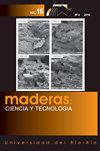桉树试件旋转摩擦焊接界面的评价
IF 1.5
4区 农林科学
Q3 MATERIALS SCIENCE, PAPER & WOOD
引用次数: 0
摘要
旋转摩擦焊通过将具有特定旋转和进给速率的木榫插入木制基材上的预钻孔中来产生接头。近年来对巴西人工林中速生桉树的焊接进行了研究。因此,本研究旨在评估巴西人工林桉树焊接接头接头接头的宏观、微观结构和热化学变化,并确定两片式桉树焊接接头的机械强度。用桉树木钉和基质制成标本。随后,进行了视觉评价和扫描电子显微镜、衰减全反射-傅里叶变换红外光谱、x射线衍射、热重、差示扫描量热和拉伸测试。结果表明:采用的旋转摩擦焊接参数有助于焊接界面致密化,形成连接销钉与基体的结构,为接头提供机械强度;由于无定形组分的热降解,桉树焊接样品的纤维素结晶度指数和表观晶粒尺寸增大。焊接接头的断裂具有延性,其平均强度为2.1 MPa。当旋转摩擦焊接参数与来自澳大利亚森林的桉树木材相似时,适用于来自巴西人工林的速生桉树的焊接接头。本文章由计算机程序翻译,如有差异,请以英文原文为准。
Evaluation of the interface of Eucalyptus specimens welded by rotary friction
Rotary friction welding produces joints by inserting wood dowels, with a specific rotation and feed rate, into pre-drilled holes made in wood substrates. Studies on the welding of fast-growing Eucalypts from Brazilian planted forests are recent. Therefore, this research aimed to evaluate the macro and microstructural and thermochemical changes at the dowel/substrate interface of Eucalypts welded joints from Brazilian planted forests and to determine the mechanical strength of two-piece Eucalypts welded joints. Specimens formed by eucalypts dowels and substrates were produced. Subsequently, visual evaluation and scanning electron microscopy, attenuated total reflectance-Fourier transform infrared spectroscopy, X-ray diffraction, thermogravimetric, differential scanning calorimetry and tensile tests were performed. The results reveal that the rotary friction welding parameters adopted contribute to the densification of the welded interface and the formation of a structure responsible for joining the dowel and the substrate, providing mechanical strength to the joint. The cellulose crystallinity index and the apparent crystallite size of the Eucalypts welded sample increase due to thermal degradation of amorphous components. The rupture of the welded joints is ductile and their average strength is 2,1 MPa. Welded joints of fast-growing Eucalypts, from Brazilian planted forests, are suitable when the rotary friction welding parameters are similar to those used for Eucalypts woods from Australian forests.
求助全文
通过发布文献求助,成功后即可免费获取论文全文。
去求助
来源期刊

Maderas-ciencia Y Tecnologia
工程技术-材料科学:纸与木材
CiteScore
2.60
自引率
13.30%
发文量
33
审稿时长
>12 weeks
期刊介绍:
Maderas-Cienc Tecnol publishes inedits and original research articles in Spanish and English. The contributions for their publication should be unpublished and the journal is reserved all the rights of reproduction of the content of the same ones. All the articles are subjected to evaluation to the Publishing Committee or external consultants. At least two reviewers under double blind system. Previous acceptance of the Publishing Committee, summaries of thesis of Magíster and Doctorate are also published, technical opinions, revision of books and reports of congresses, related with the Science and the Technology of the Wood. The journal have not articles processing and submission charges.
 求助内容:
求助内容: 应助结果提醒方式:
应助结果提醒方式:


